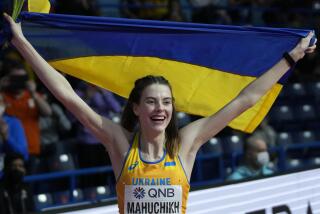Coach Pursues Freedom : Track: Tabachnik starts from scratch after bringing his family and little else from the Soviet Union to Baltimore.
- Share via
BALTIMORE — When Ben Tabachnik left the Soviet Union last December, he brought with him his wife, his son, six suitcases, $400 and a mission.
For two decades, Tabachnik worked through the grinding Soviet sports bureaucracy, publishing articles, coaching athletes and creating training methods that turned average runners into local sprinting stars.
But Tabachnik never could rise to the top coaching rank. He said that his religion, Judaism, was used against him.
Finally, a search for religious, personal and professional freedom brought him to Baltimore, where two of his sisters had settled during the 1980s.
Now, Tabachnik is prepared to embark on his greatest journey.
“I begin with nothing,” he said. “But that is a good feeling. My dream is to work with sprinters and combine these gifted athletes with scientifically based methodology.”
Tabachnik, 49, is a compact, energetic man with darting eyes and a halting voice. He speaks English fluently and presents a prodigious resume. After emerging as a top sprinter in his hometown of Baku, Azerbaijan, Tabachnik climbed a coaching ladder. He has a master’s degree in biology and physical education from the University of Azerbaijan, and a doctorate in development of speed from the National Research Institute of Physical Culture in Moscow. Since 1977, he has worked with the Soviet’s elite sprinters, spending the last five years as the head of an experimental sprinting group.
But his credentials merely put him on the first rung of an American dream. He lives with his wife, Svetlana, 49, and son, Oleg, 25, in a sparsely furnished, one-bedroom apartment in northwest Baltimore. A Russian-English dictionary sits on a bureau next to a stack of Tabachnik’s writings that have appeared in English-language journals.
“All I want is a chance,” he said.
Tabachnik has published more than 100 papers and one book on the subject of speed. The Soviets used many of his concepts to win the gold medal in the men’s 4-by-100-meter relay at the 1988 Summer Olympics in Seoul, South Korea.
Among Tabachnik’s avid readers in the United States was Frank Costello, strength coach at the University of Maryland. Three weeks ago, Costello received a call from Tabachnik and set up a meeting in College Park, Md.
“You have to understand, when a guy like this comes to the United States, it would be very simple for him to slip through the cracks and wind up working as a janitor,” Costello said. “Either people don’t appreciate his talents or they seem too specialized.”
Costello arranged for Tabachnik to speak at a seminar in Memphis, Tenn., this weekend. Among those who will attend are strength coaches for the University of Miami, Colorado, Oklahoma, Oregon State, Texas and Louisiana State, and the National Football League’s Denver Broncos and New York Giants.
The seminar appearance fee, plus aid from the Jewish Family Service, will help Tabachnik and his family survive financially through the summer. He has received job offers from the University of Wisconsin-Madison track team and the Salt Lake City-based training program “Bigger, Stronger, Faster,” and he works as a consultant with the Atletika Sports Nutrition company in San Francisco.
“Ben is beyond a shadow of a doubt the leading expert on taking youth and identifying techniques and methods to increase speed,” said E.J. “Doc” Kreis, Middle Tennessee State’s strength and conditioning coach. “He has worked from the beginning athlete to the elite athlete. The man is beyond talent. There is no way the Soviets are big on him leaving.”
Tabachnik said that he attempted to leave the Soviet Union 10 years ago, placing his career in jeopardy after failing to secure a visa.
“I am a creative person, and they don’t give me a chance to work properly,” he said. “Even if you have a Ph.D., it is impossible to become a head coach or a head in research in the Soviet Union if you are Jewish. (If you are) Jewish, you must be a member of the Communist Party. But I never joined. Even then, you’re only half of a Russian. I helped the national team. They used my ideas, my methodology, but they never gave me a chance to go abroad.”
In 1986, Tabachnik was permitted to travel abroad, and, Dec. 22, 1989, he and his family emigrated from the Soviet Union, traveling to Austria and Italy before arriving in Baltimore.
Now, he wants to teach runners and coaches his methods, providing steroid-free training based on scientific research.
“Steroids were a problem in the Soviet Union, but they were also a problem in East Germany, Italy and the United States,” he said. “Steroids provided the easy way out for coaches. They stopped thinking.”
It may be difficult for Tabachnik to sell his ideas to American track coaches. The Soviets have produced only one great modern sprinting champion, Valery Borzov, a double gold medalist at the 1972 Munich Games. Meanwhile, the Americans historically have dominated the sprints, tapping a deep pool of talent.
“The Soviets aren’t doing anything revolutionary,” said Tom Tellez, who coaches Olympic champions Carl Lewis and Joe DeLoach and college sprint star Leroy Burrell. “They’re getting the most they can out of the talent they have. There is nothing they’ve done that we haven’t researched.”
But Tabachnik has faced down detractors before, working the bureaucratic shuffle back in the Soviet Union. In the United States, he plans to work overtime to implement his training methods and produce nothing less than an Olympic champion.
“In America, I have learned that you have to make it on your own,” he said. “But in America, anything is possible.”
More to Read
Go beyond the scoreboard
Get the latest on L.A.'s teams in the daily Sports Report newsletter.
You may occasionally receive promotional content from the Los Angeles Times.










